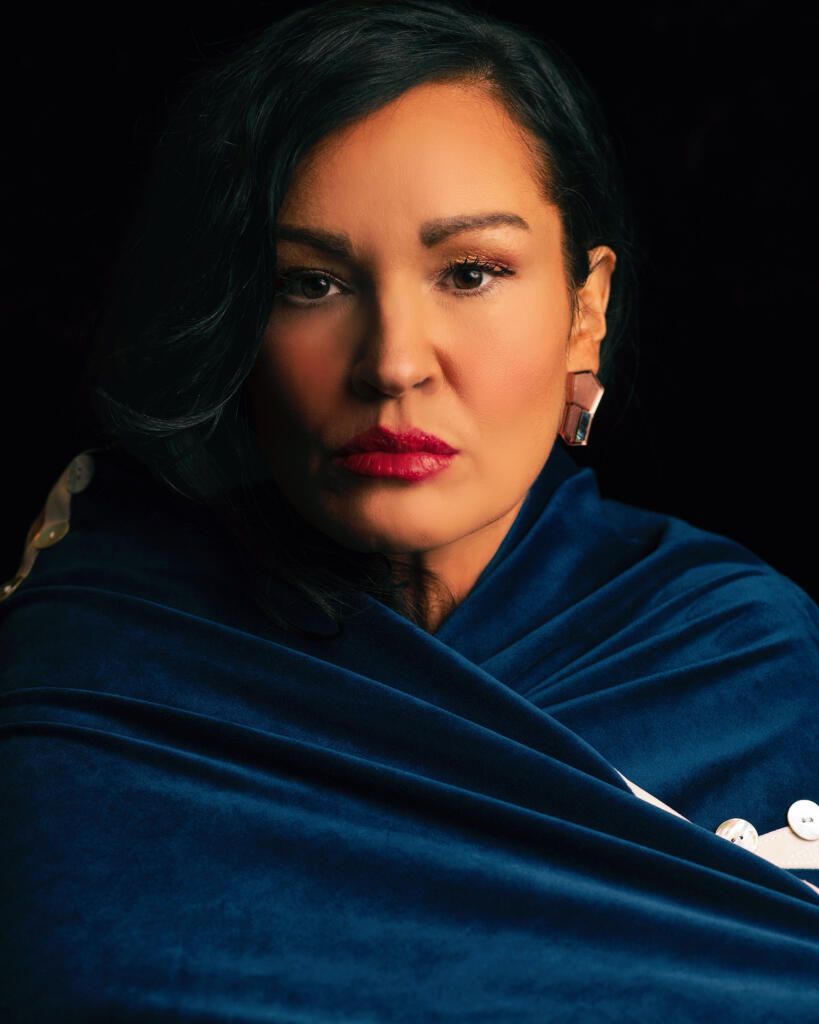She looks beyond the headlines
Unbroken: My Fight for Survival, Hope, and Justice for Indigenous Women and Girls
by Angela Sterritt
Vancouver: Greystone Books, 2023
$34.95 / 9781771648165
Reviewed by David Milward
*

“The true measure of a society is how it treats its most vulnerable members.” The quote has been attributed to both Mahatma Gandhi and former American Vice President Hubert Humphrey. Whatever one might think of either man and his legacy, and neither is admittedly free from controversy, there remains a universal truth to the quote that continues to have an enduring appeal. A book written by Gixtsan journalist Angela Sterritt, Unbroken: My Fight for Survival, Hope, and Justice for Indigenous Women and Girls, can be thought of as holding Canada up to that true measure. If the book is anything to go by, Canada has consistently earned and still deserves a failing grade with respect to the crisis of Missing and Murdered Indigenous Women and Girls (MMIWG).
One of the key contributors to the true measure is ongoing oppression of Indigenous peoples, Indigenous women and girls in particular. Lack of social and economic opportunities, and the lack of healthy stable home environments, do much to explain why many Indigenous women and girls end up in lifestyles and situations that can make them vulnerable to a serial killer like Robert Pickton, who often prowled the Downtown Eastside of Vancouver for his victims. But those social vulnerabilities can all be traced back in one way or another to Canadian colonialism, and its ongoing neglect of Indigenous peoples.

Sterritt is in my opinion more qualified than anyone else to give an authoritative voice to the dangers and vulnerabilities faced by Indigenous women. And that is by virtue of her life experience. She, like many other Indigenous children, experienced severe bullying for being Indigenous. Her childhood was made even worse by an alcoholic and physically abusive father, who kicked her out at age 14. And that’s where her life on the streets began, either homeless or in single-occupancy rooms. The book often addresses negative stereotypes with respect to Indigenous people, or people living on the streets generally. There is often a tendency to assume people at the bottom make choices that are illogical or nonsensical, and therefore those people really have no one to blame but themselves for their own predicaments. It is with her authoritative voice that Sterritt picks apart those assumptions. Her depictions make it clear the very real constraints, lack of opportunities, and the ever-present dangers of life on the streets.
“Normal” in street life is nothing like the “normal” enjoyed by the relatively privileged. Trying to stretch a few dollars to make it over the course of the week, a resigned acceptance that danger can strike at any moment, and a numb awareness that the danger can come through a betrayal from an associate (making genuine trust to any degree very difficult), are all harsh realities that cannot truly be understood unless you yourself have been in that life. To drive that point home further, making the transition to the successful and respected journalist she is nowadays was itself a process. It was like stepping into and making harsh adjustments in an alien world. What so many other Canadians who live in relative comfort and privilege take for granted was anything but “normal” for her during the first steps of her new journey.
That cognitive distance between experience and assumption means she has plenty of blame to throw around for the crisis of MMIWG. The police receive plenty of blame, as they have from other voices like with MMIWG Inquiry and the Human Rights Watch when they investigated allegations of police conduct against Indigenous peoples in the vicinity of the Highway of Tears that runs from Prince George to Rupert in British Columbia. And much of it is justified, as there have been numerous verified instances of first contact officers not properly following up on reports of MMIWG and dismissing Indigenous families on the basis of stereotypes of Indigenous women and girls partying and sleeping it off, or engaged in sex work. It gets even worse when the Human Rights Watch report sets out that many RCMP officers stationed near the Highway of Tears have themselves been accused of abusing and sexually assaulting Indigenous women and girls.

But there is plenty more blame to go around elsewhere, and indeed Canadian society almost in its entirety has earned that failing grade. Sterritt tried for years to cover MMIWG and bring their stories to press in order to raise awareness of the crisis. But her superiors would often dismiss her, or even threaten her with negative career repercussions. Their justifications were typically that other stories were more important. Other stories that involved the loss of human life often jumped the queue to news coverage, but not MMIWG. The implication is a perception that stories of MMIWG did not merit press as they would not sell. That kind of market incentive thinking is a damning indictment, not just on the world of journalism that Sterritt found herself an outlier in, but on broader Canadian society as well. The other implication is that widespread apathy and assumptions about Indigenous people meant a perceived lack of market for stories about MMIWG.
While Sterritt may be scathing in her critiques, and rightly so, she is also meticulously fair in her message as well. She recognizes that everyone is an individual, so broad societal critiques also need to be tempered with recognition of the nuances. For example, a CBC executive producer named Cate Friesen recognized the pressing need to break stories about MMIWG, and was willing to publish Sterritt’s stories when others could not be bothered. Likewise, an RCMP officer named Eric Stubbs did his utmost to try and solve MMIWG cases that he was assigned to. There are numerous sources that anyone would need to read to gain anything close to a level of understanding of the crisis of MMIWG. But this book is absolutely crucial to gaining anything resembling that understanding, as it comes from a voice who intimately understands the issues in ways no one else in the field does. I definitely recommend it.

*

David Milward is an Associate Professor of Law with the University of Victoria, and a member of the Beardy’s & Okemasis First Nation of Duck Lake, Saskatchewan. He assisted the Truth and Reconciliation Commission with the authoring of its final report on Indigenous justice issues, and is the author of Aboriginal Justice and the Charter: Realizing a Culturally Sensitive Interpretation of Legal Rights (UBC Press, 2013), which was joint winner of the K.D. Srivastava Prize for Excellence in Scholarly Publishing and was short-listed for Canadian Law & Society Association Book Prize, both for books published in 2013. His most recent book is Reconciliation and Indigenous Justice: A search for ways forward (Fernwood Publishing, 2022). David is also the author of numerous articles on Indigenous justice in leading national and international law journals. Editor’s note: David Milward has reviewed books by Jessica McDiarmid, Ronald M. Derrickson, Cherie Dimaline, Billy-Ray Belcourt, Christa Couture, and Darryl Leroux for The British Columbia Review.
*
The British Columbia Review
Interim Editors, 2023-24: Trevor Marc Hughes (non-fiction), Brett Josef Grubisic (fiction)
Publisher: Richard Mackie
Formerly The Ormsby Review, The British Columbia Review is an on-line book review and journal service for BC writers and readers. The Advisory Board now consists of Jean Barman, Wade Davis, Robin Fisher, Barry Gough, Hugh Johnston, Kathy Mezei, Patricia Roy, Maria Tippett, and Graeme Wynn. Provincial Government Patron (since September 2018): Creative BC. Honorary Patron: Yosef Wosk. Scholarly Patron: SFU Graduate Liberal Studies. The British Columbia Review was founded in 2016 by Richard Mackie and Alan Twigg.
“Only connect.” – E.M. Forster